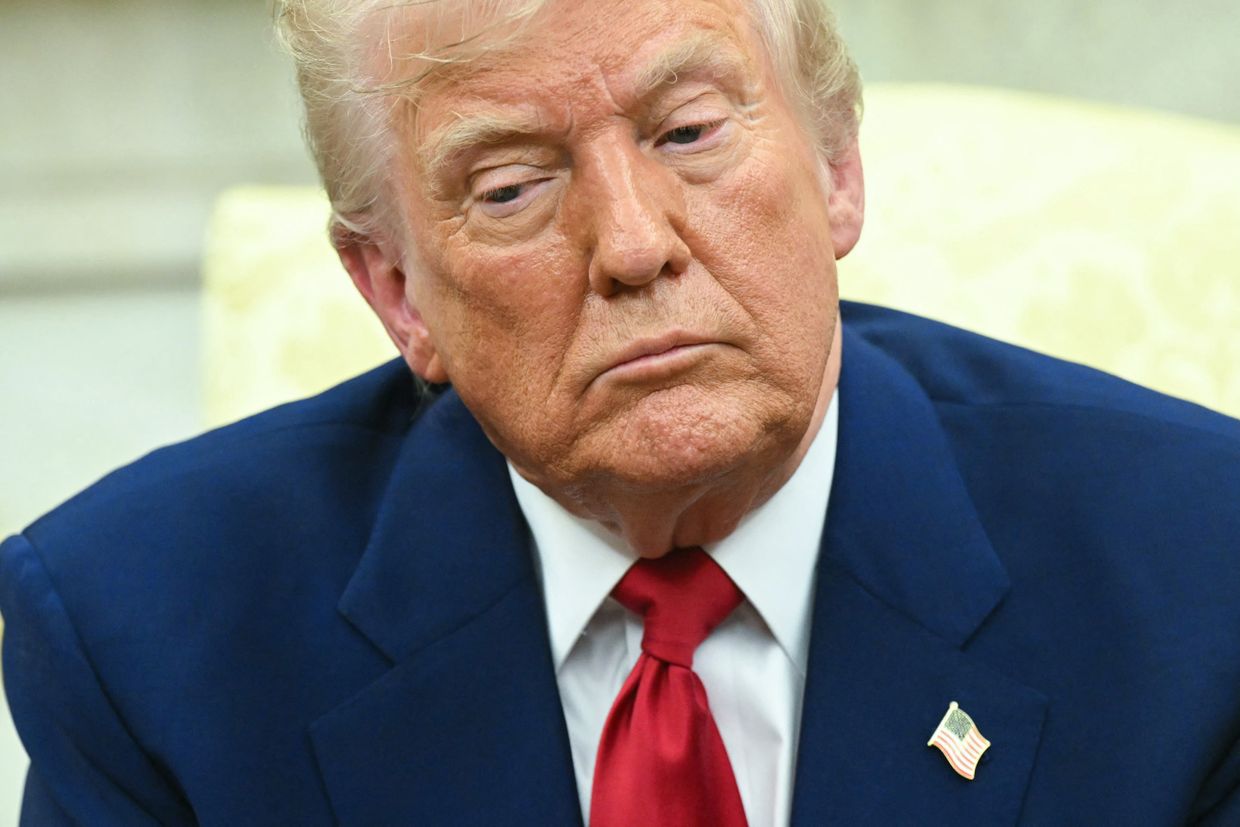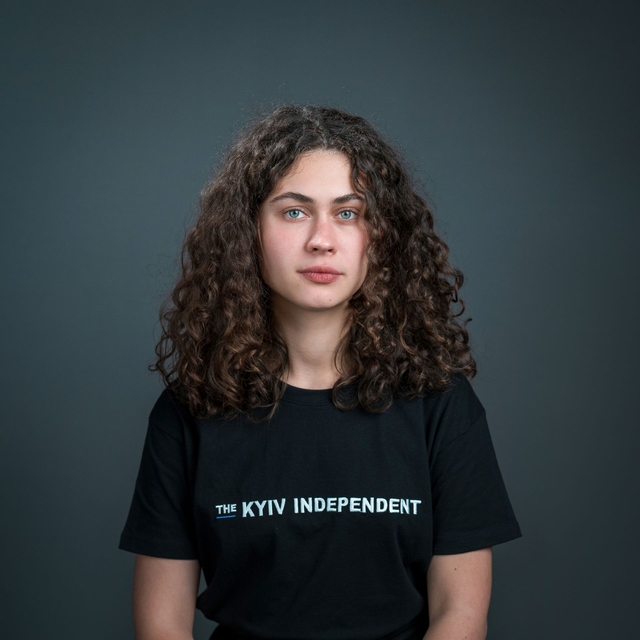In Kyiv, skepticism about ceasefire reigns as Russia ramps up deadly attacks and US remains mute

Pedestrians walk at a flea market as smoke rises in the distance following a Russian missile attack in Kyiv, Ukraine, on April 6, 2025. (Roman Pilipey / AFP via Getty Images)
Following weeks of loud statements and attempts at diplomacy, the lack of clarity feels unsettling.
Ukraine had agreed to a full ceasefire and got nothing in return. Russia had refused to comply. Over the past week, Russia further escalated its attacks on Ukrainian cities, killing dozens of civilians, among them children.
The White House, which prioritized stopping the killings in Ukraine, remained notably mute.
"I don't know what's happening there," U.S. President Donald Trump said on April 7, though he added he was "not happy... with the bombing." But has so far the White House has not taken any concrete action to pressure Russia into a ceasefire.
As a result of the grueling uncertainty, people on the streets of Kyiv and those in high cabinets say they don't believe a ceasefire can be achieved in the foreseeable future, nor that the U.S. can help bring one as it had promised.
"What kind of peace talks can there be?" Oksana, a 47-year-old cashier in Kyiv, asked.
"They announced a ceasefire dealing with the energy system, and on the same day started hitting civilians, people, and residential buildings," she told the Kyiv Independent a day after yet another Russian missile strike on Kyiv kept her awake throughout the night, worried for her children.
Like other Kyiv residents interviewed, Oksana remained skeptical of diplomatic efforts with Russia, saying that "the Russians will go to the negotiation only if it meets their conditions 100 percent."
"This is Russia's way of showing its true intentions — to continue terror as long as the world allows it."
The rising skepticism among Kyivans comes as President Volodymyr Zelensky calls for a tougher Western response, stressing that "the pressure on Russia is still not enough."

"This is Russia's way of showing its true intentions — to continue terror as long as the world allows it," Zelensky said in a Telegram post on April 6.
Oleksandr Merezhko, head of the parliament's Foreign Affairs Committee and a lawmaker from Zelensky's Servant of the People party, believes that people in Kyiv have "more and more disappointment and less and less illusions about the possible ceasefire."
"We see that initially, people had some hope that maybe before Easter, as Trump wanted, there would be a ceasefire," Merezhko told the Kyiv Independent.
"But with each day, this hope diminishes," he added, referring to the growing number of deadly attacks.
Zelensky, whose hometown of Kryvyi Rih in central-eastern Dnipropetrovsk Oblast suffered a missile strike on April 4 that saw at least 20 killed, including nine children, stressed that the Russian attack numbers were growing.
On April 6, an overnight Russian ballistic missile strike on Kyiv killed at least one and wounded three.
Russian troops have launched over 1,460 aerial bombs, almost 670 drones, and over 30 missiles of various types against Ukraine during the past week, according to Zelensky.
Merezhko dashed the feasibility of a potential ceasefire with Russia, saying that Russian President Vladimir Putin does not appear interested in such a deal. The lawmaker explained that Putin continues to put forward "absolutely unacceptable demands and conditions."
Earlier in March, Ukraine agreed to the U.S.-proposed 30-day ceasefire. Russia has so far rejected the proposal, demanding that Ukraine be barred from receiving Western military aid and mobilizing and training new troops.
Among the latest demands, Putin said he would favor a change of government in Ukraine to continue talks.
Trump has thus far insisted on Putin's commitment to the potential truce, trying to end the war in Ukraine by pressuring Kyiv instead of Moscow.
Ukrainian officials say Putin doesn't want peace and is using the time to inflict more damage.
"What we see from his actions: he continues to kill civilians, including children in Kyiv," Merezhko said.
"So judging not by his words but his actions, he has no intentions to have any reliable, stable, sustainable ceasefire."
"Ukrainian society has long had no illusions about the sincerity of Russia's intentions," according to Dmytro Fomin, former public opinion researcher at the Center for Content Analysis.


Mykyta Poturayev, head of the parliament's Humanitarian and Information Policy Committee and Vice-President of the OSCE Parliamentary Assembly, said, "There is no room to discuss ceasefire" when Putin doesn't want to stop the war.
Poturayev said it is difficult to make predictions when no one knows the potential decisions that the U.S. could make in the coming months regarding the war.
"Nobody knows what the position of the U.S. will be in the long run," Poturayev told the Kyiv Independent.
Peace talks began when Trump abruptly declared the start of negotiations to end the war in Ukraine after a phone call with Putin in February. Since then, Trump's team has met with both the Russian and Ukrainian delegations in hopes of ironing out conditions for a potential agreement.
The U.S. took a sharp policy shift in early March, temporarily freezing its military aid and intelligence sharing to Ukraine following a heated Feb. 28 Oval Office clash between Trump, his Vice President JD Vance, and Zelensky.
Following a series of Russian attacks on Ukrainian cities over the past week, Trump reiterated his calls for a ceasefire and said, "I don't like the bombing."
"We are talking to Russia. We would like them to stop," Trump told reporters on April 6.
Olexiy Haran, politics professor at the Kyiv Mohyla Academy, said the intensified attacks may be Russia's intent to "maximize the stakes" and possibly to show it to Trump in particular.
"The question here is how we can break the Russian position — the only thing (that can) is pressure," Haran told the Kyiv Independent.
"But (Trump) is not doing anything right now."
Poturayev was more optimistic.
"With every day, we (Ukraine, the U.S., and Europe) have a more and more common understanding of the situation of Russia's real position," Poturayev said.
People who spoke with the Kyiv Independent, however, don't expect this to lead to any sort of result.












